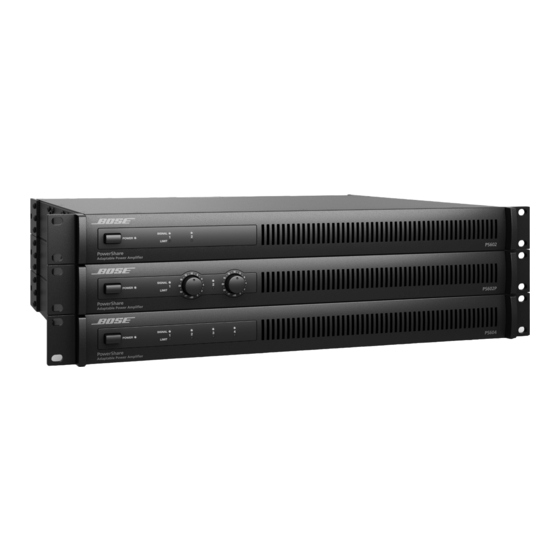- ページ 28
アンプ Bose PowerShare PS602PのPDF 設置および操作マニュアルをオンラインで閲覧またはダウンロードできます。Bose PowerShare PS602P 40 ページ。 Adaptable power amplifiers
Bose PowerShare PS602P にも: 設置および操作マニュアル (40 ページ), 設置および操作マニュアル (46 ページ)

Software Interface
PowerShare Editor Software
Access advanced digital loudspeaker processing features using the free web-downloadable PowerShare Editor software.
The PowerShare Editor software accesses all of the FreeSpace®, Panaray®, RoomMatch® Utility, and F1 Passive loudspeaker
EQs, as well as 9-band PEQ, standard mixing, band pass filtering, limiters, delay, mute polarity inversion, and output
polarity inversion.
Ensure the CONFIG DIP switch is set to SOFTWARE when using the PowerShare Editor.
The fixed architecture enables the following features:
• 9-Band Parametric EQ (PEQ)
Adjust input EQ, per channel. The default setting is Flat.
• Standard Mixer
The 2x2 or 4x4 standard mixer allows for routing of any input to any output, and can mix inputs as well. The default
setting routes each input to its output (1:1). For example, INPUT 1 is routed to OUTPUT 1, INPUT 2 is routed to OUTPUT 2,
etc.
• Band Pass
Set high-pass (HPF) and low-pass filters (LPF), per channel. The default setting is Flat. Crossovers are automatically
loaded with each loudspeaker EQ.
• 9-Band Speaker EQ
Choose any FreeSpace, Panaray, RoomMatch Utility, or F1 Passive Bose loudspeaker EQ, with associated limiter settings
and crossover, per channel. The default setting is Flat. In Hi-Z output mode, a 50 Hz HPF is automatically added to the
Hi-Z selected outputs. The loudspeaker EQ is applied after the 50 Hz HPF.
• Vpeak and Vrms Limiters
Both values are loaded automatically when a Bose loudspeaker is selected in the Loudspeaker EQ block. The values
are always adjustable. In 70V mode, a 100 Vpeak limiter is automatically loaded. In 100V mode, a 141 Vpeak limiter is
automatically loaded. These are maximum values that can be lowered if necessary using the PowerShare Editor software.
• Delay
Apply up to 50 ms of delay on Channels 1 & 2 for each amplifier model, in increments of 0.1 ms. The default setting is 0
ms delay.
• Output
Each output can be set to inverted output polarity. The default state is non-inverted.
• Mute Polarity
The default state is Normally Open (NO), where a short across the mute connector will mute all outputs. The mute
polarity can be inverted to Normally Closed (NC), where an open across the mute connector will mute all outputs.
NOTE: All Limit LEDs will blink red when the amplifier is muted from software, or from the rear panel mute connector.
Setup files can be saved and loaded into other similar PowerShare amplifiers for quick duplification of amplifier settings.
Amplifier DIP Switch Settings
The position of the CONFIG DIP switch, located on the rear panel of the amplifier, determines whether the amplifier
settings are configured using the PowerShare Editor software or the rear panel EQ dials.
• If the CONFIG DIP switch is set to SOFTWARE, configure the amplifier using PowerShare Editor software. You can
disconnect the amplifier from the PC when setup is complete and the amplifier will retain the settings.
If you use the PowerShare Editor software to configure the amplifier, and then change the DIP switch setting to REAR,
the amplifier loads the EQ dial settings instead, and the other settings configured using the software return to their
default states. The software settings do not get erased. If the DIP switch is changed back to SOFTWARE, all of the
software settings are reloaded.
• If the CONFIG DIP switch is set to REAR, configure the amplifier using the EQ dials on the rear panel of the amplifier.
If you configure the amplifier using the rear panel EQ dials, and then change the DIP switch setting to SOFTWARE, the
amplifier configuration changes to software loaded settings. If the amplifier has not been configured by software, then
all the settings return to their default states. If the DIP switch is changed back to REAR, then the EQ dial settings are
reloaded.
28 English
pro.Bose.com
Installation Guide
